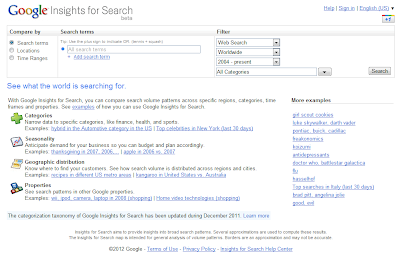This tool will allow you to analyze trends in search terms on Google. So you can identify the keywords most wanted at the moment (and on a certain area) to optimize your site on those keywords. It is also possible to compare up to 5 keywords at the same time and see trends and their relation to each other. If your site follows the trends on the net you will increase your traffic. Furthermore, Google Trends also lets you see trends in visits to any website (with a minimum traffic significant), which will allow you to analyze competitor sites and see where they stand. Although similar to Google Analytics, this tool allows to analyze / compare trends analyzed sites without providing precise statistical figures. Link: www.google.com/trends
As you probably know, Google has released a modified version of Google Trends , this time with much more detail.
Google Website Trends : http://trends.google.com/websites
Google Search Trends : http://trends.google.com/trends
Original Google Trends : http://www.google.com/trends
Now the same way that Alexa , Compete , Quantcast or Comscore , Google gives us info on most websites that have significant traffic.
So you can know how many visitors your competitors but even better (or worse) the most typed keywords that bring the most traffic on these sites.
And this is where some will ca gate ... and for others it is a miracle ...
Take for example a shop in a highly competitive field. A store is a huge traffic while B despite numerous efforts do not reach the 10th traffic A.
This appears that there is Google Trends .. B consults with 10 keywords most providers of traffic at A, the pat on the Google engine and can calmly analyze each of the pages that make the success of A.
Woe to A because B will be able to emulate his strategy by replicating pages A. Happiness to B which is on Google Trends all the info he wanted to know about its competitor: visitors traffic, keywords bring the most traffic.
Good care that does not work with all sites as some, we do not find information if the site has specifically requested from Google.
Moreover coincidentally the sites of the giant does not appear in Trends .. (Google, Youtube, Blogger, etc ...)
For against those of competitors like Yahoo or Microsoft are ...
Google explains this by this:
"We Have a policy of not Providing interim financial guidance, and Have Decided not to release Google numbers in Accordance With That policy. We are always open to Reconsidering decisions we've made, aim at this point, for Reasons thesis financial guidance, we do not share the numbers in Google Trends for Websites tool "
Easy excuse, right? Google my name so I throw everyone except me.
Google has even started embedding URLs by Trends site in its index:
But then where do these data and are they reliable?
As noted in Philip of Accessoweb , these data are collected through the millions of Google toolbars installed worldwide.
I'll add that even better than Google Toolbar, Google Analytics is software data mining perfect since he knows everything about everything if you installed it on your site.
And even worse if like me you had checked " Share my Google Analytics data ... "
Besides curiously after the release of Google Trends at least one or two queries in Google's index. No I would not draw conclusions.
In this regard here's how not to share your Analytics data with Google products, Trends include:
Click " Change account settings and data sharing "on your Analytics homepage (top).
Select "Do not share my Google Analytics data"
This will not guarantee you to be absent from Google Trends, but it will surely be less accurate.
In the expectation that Google offers a solution to Opt-out if one does not want its own data embedded in Trends.
Boost Your Blog Traffic With Google Trends
Google Insights for Search
With Google Insights for Search , you can compare search volume patterns across regions, categories, time periods and specific properties. See examples of how you can use Google Insights for Search.
Categories : Narrow data to specific categories such as finance, health and sports.
Frequency : Anticipate the demands of your business so you can plan the budget and the corresponding targets.
Geographical Distribution : Know where to find customers. See how search volume is distributed among regions and cities.
Properties : See the patterns of research on other Google properties.





















